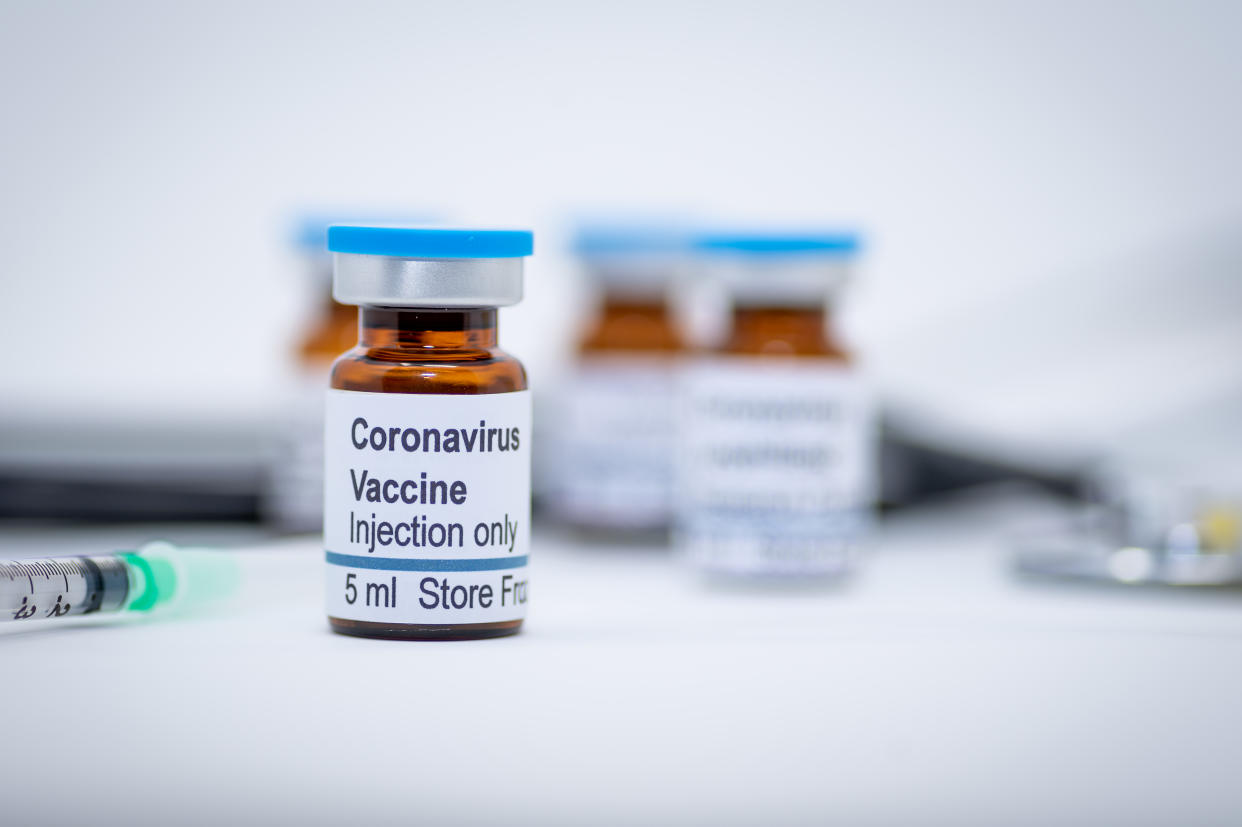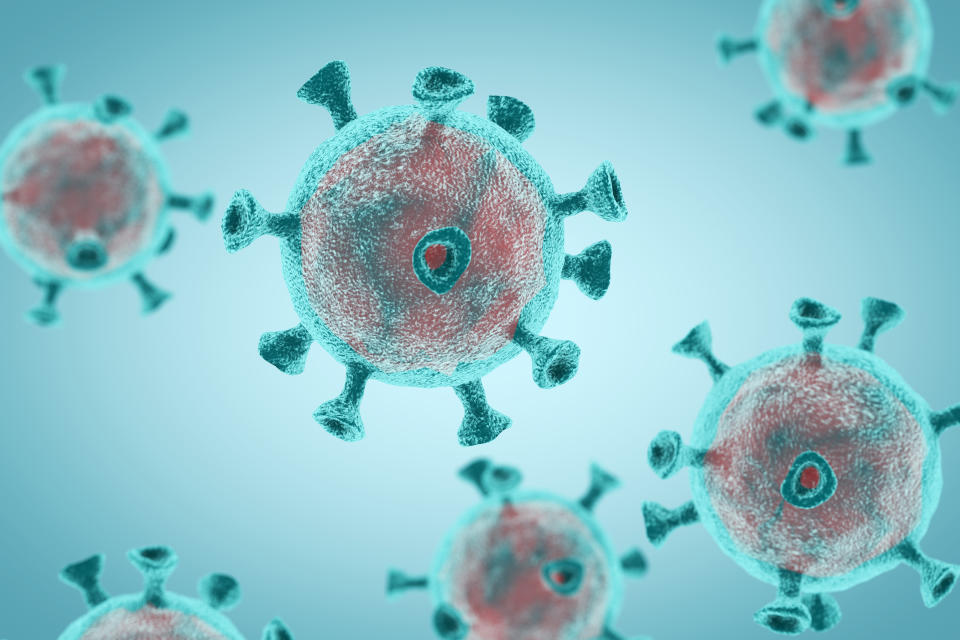Coronavirus vaccine will not have been rushed as experts reassure 'the safety regulatory process is still there'

With hopes of a coronavirus vaccine rising, experts are keen to put to bed any concerns the jab may have been rushed.
An immunisation programme has long been hailed a route back to life as we once knew it. Many were therefore excited when the pharmaceutical giant Pfizer revealed its vaccine candidate appears to be more than 90% effective at preventing the infection.
Scientists and officials alike have stressed this is just a small light at the end of a long tunnel, however, it has also been suggested a handful of people in the UK could receive the vaccine by the end of 2020.
It may then be rolled out further, with those most at-risk of infection or coronavirus complications – like NHS staff and the elderly – being at the front of the queue.
Read more: Long COVID patient 'gets so dizzy he cannot write a letter'
While it may sound reassuring, some people have expressed concern the injection may be rushed, as officials work to get a handle on the pandemic.
Experts have stressed, however, the vaccine’s “safety regulatory process is still there” even if it all feels a bit hasty.

A recent study by the London School of Hygiene & Tropical Medicine (LSHTM) found around 90% of parents would likely be willing to have a coronavirus vaccine, as well as allowing it to be given to their children.
Separate research by LSHTM found just over half (54%) of those surveyed in the UK would “definitely” accept a jab, falling to around two in five (41.2%) in the US.
After being shown online misinformation, that dropped by 6.4% in the UK and 2.4% in the US.
Read more: Black people twice as likely to catch coronavirus as white counterparts
Social media is often blamed for peddling anti-vaxx conspiracy theories, like the much-discredited “research” by the now struck off gastroenterologist Andrew Wakefield that linked the measles, mumps and rubella (MMR) jab to autism.
“COVID-19 [the disease caused by the coronavirus] vaccines will be crucial to helping to end this pandemic and returning our lives to near normal,” said Professor Heidi Larson, author of the second LSHTM study.
“However, vaccines only work if people take them.”
The vaccine will ‘not just sit on a pile of things to be approved’
Safety concerns appear to be the biggest issue when it comes to any vaccine.
With the coronavirus, however, the infection was only identified at the end of 2019.
Fast forward 11 months and officials are already talking about an immunisation programme, a process that usually takes up to 15 years.
In April, a team of ethicists warned a pandemic is “not an excuse to lower standards”.
Professor Larson stressed, however, this “quickness” is just “perceived”.
Pfizer’s vaccine is the first to be developed with mRNA technology, which is typically used for cancer therapies. This instructs healthy human cells to generate a coronavirus protein, leading to an immune response.
The technology makes the jab quicker and easier to manufacture than traditional vaccines, which involve administering part of a virus or a whole but inactivated pathogen.
“We have new technologies we should be celebrating,” said Professor Larson.
“There is a lot of anxiety about the speed; the newness of the virus and the vaccine.
“The things being shortened are the administrative processes. The safety regulatory process is still there.
“The timeframe between things they’ve tried to shorten, but it’s [the vaccine] not just sitting on a pile of things to be approved. It’s got a fast-track lane to get attention.”
Read more: The obstacles that could hold back Pfizer's coronavirus vaccine
Professor Pauline Paterson – author of the first LSHTM study – agreed, adding: “It’s not just the ‘anti-vaxx’ that have concerns about speed and newness.
“The public need to be reassured the [safety] processes are in place and any vaccine that is put forward [for widespread immunisation] has been thoroughly tested.”
After any animal or laboratory studies, a potential vaccine enters a phase 1 trial, where it is usually tested for safety in healthy volunteers.
If successful, a phase 2 trial involves testing the jab in a larger group to again determine safety, as well as the optimal dose.
In phase 3 trials, the vaccine is tested on thousands of people to see how effective it is. Safety monitoring also continues after a jab is approved.
Pfizer aside, the pharmaceutical giant Janssen is testing its coronavirus vaccine candidate on 6,000 people as part of a UK trial.
The US biotech firm Novavax and the University of Oxford-AstraZeneca also have jabs in ongoing studies.
Watch: Can you catch coronavirus twice?
By instructing cells to make a coronavirus protein, some worry the novel mRNA technology could affect a person’s genetics.
These concerns were fuelled when Emerald Robinson, a White House correspondent for the pro-Trump website Newsmax, told her 281,000 Twitter followers the Pfizer vaccine “tampers with your DNA”.
The jab contains a fragment of the virus’ genetic material, known as RNA. In simple terms, RNA is a precursor to the more well known DNA.
“It does not change your DNA,” said Professor Larson.
“It changes the behaviour of the virus, full stop.”
Pfizer spokesperson Andrew Widger agreed, adding the jab “does not alter the DNA sequence of a human body. It only presents the body with the instructions to build immunity,” according to the BBC.
Coronavirus receiving unprecedented funding
The previous PHEICs did not benefit from the same level of funding. The Coalition for Epidemic Preparedness Innovations (Cepi) was founded after the devastating Ebola outbreak of 2013 to 2016 that killed more than 11,000 people.
Read more: Two-thirds of hospitalised coronavirus patients endure long COVID seven weeks after discharge
“[Cepi] was created when we saw the resurgence of Ebola,” said Professor Larson.
“There was no funding mechanism to fund emergency outbreaks in terms of clinical trials.”
The UK government has reportedly pre-ordered 10 million doses of Pfizer’s vaccine, with two doses being required per person.
“The UK is already manufacturing vaccines, should they be seen to be safe and effective, so they’re ready [to roll out],” said Professor Paterson.
“Normally that wouldn’t happen.”

Pandemic has created ‘appetite for vaccine’
If and when a coronavirus vaccine gets approved, secretary of state for health and social care Matt Hancock has confirmed it will not be mandatory to get immunised.
“We are not proposing to make this compulsory,” he said. “Not least because I think the vast majority of people are going to want to have it.”
Professor Paterson agreed, adding the demands of the pandemic have created “an appetite for this vaccine”.
“When people realise they can’t have the vaccine [because of patient prioritisation], people will want it,” she said.
“The same [happened] with the flu vaccine this year; people not in an at-risk group want it.”
The issue of whether to make vaccines compulsory is a controversial topic. Certain people, like those having chemotherapy, are unable to have jabs due to their immune system being suppressed. They therefore rely on others to get vaccinated in order to create herd immunity.
Despite the importance of vaccines, Professor Paterson agreed they should not be compulsory.
“It’s key to find out why people are not vaccinating,” she said.
“Sometimes they call the clinic and wait 15 minutes on the phone and can’t get through.
“Parents and guardians must be supported to understand the benefits of children being vaccinated, such as protecting grandparents and older relatives.
“To alleviate concerns, information on how COVID-19 vaccines are developed and tested, including their safety and efficacy, should be described clearly to the public.
“[Making the vaccine compulsory] may increase uptake, but it won’t increase confidence.”
A mandatory immunisation programme would also mean more vaccine slots will have to be created at GP surgeries. This may be enough to persuade someone to have the jab willingly, particularly if difficulty booking an appointment is what puts them off, according to Professor Paterson.
Professor Larson added a vaccine can only be compulsory if sufficient doses are available. The Pfizer jab, if approved, will be in relatively short supply initially.
Even if a coronavirus vaccine did one day become mandatory, this would unlikely apply to the general public, but more those in at-risk jobs, like healthcare workers, she added.
This comes after an ethicist recently argued people should be paid to have a coronavirus vaccine if and when one is approved. One expert warned, however, this would “set a very dangerous precedent”.
Watch: What is long COVID?



